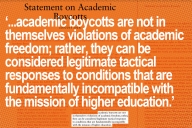You have /5 articles left.
Sign up for a free account or log in.
Ursinus College hasn’t yet named its 2017 commencement speaker, but one thing is clear: it won’t be Juan Williams. The journalist and longtime Fox News contributor and co-host was approached by the college’s president to possibly address graduates and receive an honorary degree but was eliminated as a candidate after faculty members objected.
“Once it became clear that faculty had reservations -- I spoke to people from different parts of the college and different parts of the political spectrum and encountered not one who thought inviting Williams would be a good move -- our choice of commencement speaker had to be reconsidered,” Jonathan Marks, a professor of politics at Ursinus, said via email.
Tom Yencho, a college spokesman, confirmed that Williams was approached but will not be speaking. A committee was formed last month to review speaker nominations and the overall selection process, he said. Ursinus is “continuing to work toward developing a more streamlined and collaborative selection process, which we anticipate to have in place by the end of this semester.”
Planned commencement speakers have been disinvited from or backed out of various talks in recent years amid pressure from campus groups -- usually students. Robert Birgeneau, former chancellor at the University of California, Berkeley, canceled his speech at Haverford College in 2014, for example, after some 40 students and instructors asked him to apologize for a 2011 incident in which police injured protesters on his campus.
Williams, however, apparently faced fierce opposition from faculty members, who were also asserting a right to weigh in on honorary degrees before they are offered. Their concerns stem from a well-documented sexual harassment case against him dating back to his time at The Washington Post and charges of plagiarizing parts of a column written for The Hill in 2013. Faculty members say that Williams’s public responses to those allegations fell short of contrition. In the first case, Williams initially claimed that he made "attempts at being friendly" but later apologized publicly for verbal conduct he knew was "wrong." The Hill eventually updated Williams's 2013 article to include a "previously omitted attribution," but he did not cop to plagiarism.
Via email, Williams said Monday, “Nearly 25 years ago I apologized for any misunderstanding that took place at the Post. Ursinus is a fine school and I wish their graduates nothing but success.”
Marks said that Williams “not only has some serious blots on his record but has refused to take responsibility for them. … We expect our students to act better than Williams did in those two cases, and to accept responsibility for their actions when they have not acted well. I thought that granting Williams an honorary degree, although he has done some genuinely praiseworthy things, would send the wrong message.”
No stranger to controversy, Williams also was fired from National Public Radio in 2010 for saying on Fox that he worried about flying on planes with those in "Muslim garb." He's won praise, though, over his long career, including for his book Eyes on Prize: America's Civil Rights Years, 1954-1965.
Despite some familiar themes, Marks said it was ethics, not politics, that motivated the faculty to act against Williams. “I am a political conservative, and although I am aware that controversies over speaker choices often play out as liberal faculty versus conservative outsider,” he said, “that is emphatically not the case here.”
It’s unclear how close Williams thought he was to the gig, which he was told would likely come with an honorary degree. Yencho said that Williams was originally approached by Brock Blomberg, Ursinus’s president since 2015, “to gauge his interest and his availability, but was not formally selected by the committee, nor was his name officially brought forth for faculty and trustee approval …. We anticipate a much more robust and collaborative process moving forward.”
This is the second controversy the Pennsylvania college has faced this academic year. In September, Michael C. Marcon, facing criticism over his comments on Twitter, resigned as chair of the college's governing board. Another board member had previously resigned over Marcon's tweets, which opined on who should and shouldn't wear yoga pants, Caitlyn Jenner's speaking fees in relation to the gender wage gap, and bumper sticker politics.









